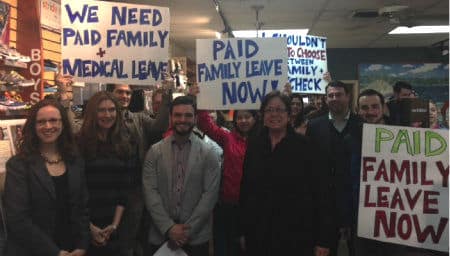Behind the Polls: Why Voters Want Time to Care

Hila Ritter and her husband in Portland, OR, both work-full time. Yet neither job includes any paid leave. So Hila worked while ill during her pregnancy to hold on to her sick days and saved up her vacation days. Still, most of her maternity leave came without pay. For this couple, the joy of a new baby was coupled with depleted savings, debt, and the need to apply for food stamps.
What about those with no paid leave and no savings? Chantia Lewis and her husband and baby in Milwaukee had to move in with her parents. Shelby Ramirez in Denver, who needed a few weeks to care for her daughter and her father after surgeries, received eviction notices and had to pawn the only thing of value she owned. Elizabeth Fredette in Massachusetts worked 12-hour days in her last month of pregnancy instead of the bed rest her doctor ordered, and was back at work within four weeks of giving birth.
These women are advocates of paid family leave—and they’re not alone. A recent poll by Public Policy Polling (PPP) in 15 key electoral states found strong support for policies like paid sick days and paid family leave—and a clear connection between that support and the hardship families experience when those policies are not in place. Like Hila, Chantia, Shelby, and Elizabeth, nearly 60 percent of those polled said they would face significant economic hardship if they had to take time without pay to care for a newborn or a seriously ill loved one or to deal with their own major illness.
Babies, like serious illness or major surgery, touch nearly all of our lives. Yet for millions of Americans, such an event can send a family spiraling into poverty or prevent them from climbing out. As researchers at Brandeis highlighted, race and class influence the impact on families of such “income-disrupting events.” Not surprisingly, these carry a much bigger punch for those with fewer resources.
Right now the only federal law in the U.S. regarding family leave is the Family and Medical Leave Act (FMLA), which went into effect twenty-three years ago. The FMLA established the principle that having a family shouldn’t cost you your job. It created up to 12 weeks unpaid leave to care for a new child or recover from serious personal or family illness and guarantees a person can return to the same or equivalent job and keep their health insurance during leave.
But the FMLA applies only to businesses with 50 or more employees and requires people to have worked for the same employer for at least a year and to work an average of 25 hours a week in order to be eligible. That leaves out forty percent of the workforce. Millions who are eligible forego treatment or return to their jobs too soon, mainly because the time is unpaid.
In fact, researchers at the University of Chicago found nearly one in four people say they’ve been fired or threatened with firing for taking time to care for a loved one. Job loss can upend a family for a longer period of time, affecting future as well as current income.
But policies like paid family leave can make a critical difference. Paid leave helps women keep their jobs. Women in states with paid leave programs are less likely to receive public assistanceor rely on food stamps following a child’s birth, particularly when they use the paid leave programs.
Paid leave also helps seniors maintain independence and stay out of poverty. When cared for by family members, patients in the hospital recover from illness and injury faster, leading to shorter hospital stays, improved health outcomes, and decreased health costs.
Women were the biggest supporters of paid leave policies in these polls, but men weren’t far behind. Family and medical leave insurance increases men’s role in caregiving by making it possible for them to be involved without the family taking a big financial hit. In Rhode Island, during the first year that paid time off for caregiving was available, nearly one-third of all leave takers were men.
Like earlier polls, the PPP findings confirm that voters care about these issues. While 70 percent said they have not heard much or anything at all about paid leave from candidates running for office, respondents were more likely to support candidates who favored creating a national paid family and medical leave fund. And support for the issue comes from Republicans and independents as well as from Democrats.
Hila, Shelby, Chantia and Elizabeth have all become activists in the fight for paid leave funds in their states and nationally. They understand that a nation that values families and economic independence must make family leave affordable and accessible for all. With the 2016 election looming, now is the time for politicians of all stripes to embrace the paid leave laws that these advocates and a majority of Americans support.
Ellen Bravo directs Family Values @ Work, a network of coalitions in 24 states working for policies like paid sick days and paid family leave.
This article originally appeared on Spotlight on Poverty.